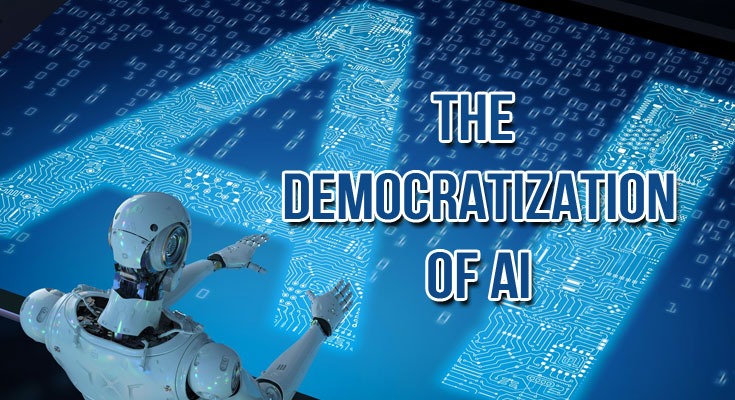In the rapidly evolving landscape of technology, Artificial Intelligence (AI) has emerged as a transformative force, reshaping industries and societies alike. Once confined to the realms of research labs and tech giants, AI is now undergoing a profound democratization – a shift that brings the power of intelligent systems into the hands of the many. This seismic change is altering the way we live, work, and interact, opening up new possibilities and opportunities for individuals and businesses worldwide.
The Evolution of AI Accessibility
The democratization of AI is a journey marked by significant milestones. Not too long ago, AI development was a privilege reserved for well-funded corporations and elite research institutions. The computational power required, along with the expertise in machine learning algorithms, made AI an exclusive domain. However, recent advancements in technology, increased computing capabilities, and the availability of open-source tools have democratized access to AI.
Cloud computing has played a pivotal role in this shift. By providing scalable and affordable access to computational resources, cloud platforms have lowered the barriers to entry for AI development. Now, even small businesses and individual developers can harness the power of vast computing resources to train and deploy AI models without the need for substantial upfront investments.
Empowering Small Businesses and Entrepreneurs
One of the most significant impacts of AI democratization is its ability to level the playing field for small businesses and entrepreneurs. With access to AI tools and technologies, these entities can enhance their operations, improve decision-making processes, and gain a competitive edge in the market.
For instance, AI-powered analytics tools enable small businesses to derive meaningful insights from large datasets, helping them understand customer behavior, optimize supply chains, and streamline operations. Chatbots and virtual assistants, driven by AI, empower businesses to provide enhanced customer experiences, even with limited human resources.
Moreover, the availability of pre-trained models and AI frameworks simplifies the development process. This means that individuals with a basic understanding of machine learning can now create and deploy AI applications, fostering innovation across various industries.
Democratization in Education
The democratization of AI is not confined to businesses alone; it extends to education as well. As AI tools become more accessible, educational institutions are incorporating them into their curricula, providing students with hands-on experience in AI development and application.
This educational democratization not only prepares the next generation for a technology-driven future but also ensures a more diverse pool of talent entering the field. As AI becomes a fundamental skill, individuals from various backgrounds and disciplines can contribute to and shape the future of this transformative technology.
Ethical Considerations and Challenges
While the democratization of AI brings about positive changes, it also raises ethical considerations and challenges. As AI becomes more widespread, ensuring responsible and ethical use of these technologies becomes paramount. Issues such as bias in algorithms, privacy concerns, and the potential misuse of AI must be addressed through thoughtful regulation, education, and ongoing dialogue within the global community.
Another challenge lies in closing the knowledge gap. While AI tools are becoming more accessible, ensuring that individuals have the necessary skills and understanding to use them effectively is crucial. Efforts in education and training programs are essential to equip people with the knowledge required to navigate the complexities of AI development responsibly.
The Future of AI Democratization
Looking ahead, the democratization of AI is poised to continue reshaping industries and societies. Open-source initiatives, collaborative development, and community-driven efforts will play key roles in advancing AI accessibility. The ongoing dialogue on ethical considerations and responsible AI practices will guide the development and deployment of these technologies in a way that benefits humanity as a whole.
In conclusion, the democratization of AI marks a revolutionary shift in the technological landscape. From enhancing business capabilities to transforming education, AI is becoming a tool that empowers individuals and organizations across the globe. As we navigate this era of AI accessibility, it is crucial to prioritize ethical considerations, promote education, and work towards creating a future where the benefits of AI are shared by everyone.




